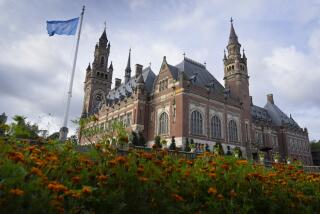Prosecutor Asks Court to Rescind Rwandan’s Release
- Share via
ARUSHA, Tanzania — Appealing for justice for the victims of the Rwandan genocide, the United Nations’ chief war crimes prosecutor urged an appeals court Tuesday to rescind its decision to release one of the suspected masterminds of the 1994 slaughter.
Prosecutor Carla del Ponte is seeking to persuade the appeals court of the International Criminal Tribunal for Rwanda to review its decision to free Jean-Bosco Barayagwiza, the leader of an extremist ethnic Hutu party that advocated the massacre of ethnic Tutsis.
“The accused is responsible for the death of over 800,000 people in Rwanda,” Del Ponte said. “The evidence is there. It is irrefutable. He is guilty. Give us a chance to bring him to justice.”
The appeals court ordered the release of Barayagwiza, 50, in November on the grounds that he had been detained without being charged for several months after his arrest and that his legal rights had been violated.
Barayagwiza, who pleaded not guilty in February 1998 to six counts of genocide and crimes against humanity, has remained in custody. Legal observers say his release would deal a crushing blow to the tribunal, whose mandate is to try those accused of being the architects of the massacre. The observers said the fact that the court allowed such a technicality to prevail could damage the tribunal’s judicial integrity and lead to a loss of public confidence.
Others argued that the procedural glitch in the Barayagwiza case was the manifestation of an overall management problem of the tribunal, which is based in Tanzania. They said Barayagwiza’s release would be a wake-up call to the international court, which has been criticized for the inefficiency of its operations.
The freeing of Barayagwiza also could further sour relations with Rwanda’s government, from which the tribunal needs cooperation to do its work.
The Rwandan government has sought the release of Barayagwiza into its custody and has promised to give legally binding assurances that the death penalty would not be imposed if he were brought before its national courts and found guilty.
U.S. government officials said they would support a move to transfer Barayagwiza to Rwanda.
“We firmly believe that [he] should be brought to justice, whether it is before the Rwanda tribunal or before a competent national court,” said David Scheffer, U.S. ambassador at large for war crimes issues. “We do not want this man to walk free.”
The prosecution is seeking to file a new indictment against him. On Tuesday, Norman Farwell, an assistant prosecutor, referred the judges to documents indicating that Barayagwiza’s attorneys had rejected earlier hearing dates.
The defense argued that the prosecution had failed to introduce any new facts that would justify Barayagwiza’s continued detention. The lawyers also said the appeals court has no jurisdiction to conduct the review because it normally is allowed to rule only in cases in which the accused has been convicted.
Charles Achaleke Taku, defense counsel for another genocide suspect, agreed, saying that the critical issue at hand is ensuring that the rule of law is upheld.
“The issue is, were his rights violated and were these violations condoned?” Taku said. “The tribunal is legally justified in releasing him in order to make this process credible. It [concerns] the sanctity of the judicial system.”
But human rights activists and Rwandan genocide survivors said it would be a mockery of justice if Barayagwiza walked free when he was widely known to have been engaged in inciting ethnic hatred even before the killings began.
Barayagwiza was the president of the extremist Hutu Coalition for the Defense of the Republic and helped found RTLM, a radio station that allegedly incited Hutus to kill Tutsis.
“He was very openly the brains and the propaganda behind the whipping up of the ideology of the genocide,” said Rakiya Omaar, director of African Rights, a London-based group. “If the tribunal says its rationale of existence is to get the planners of the genocide, he is one. If he can get off . . . it bruises the morale of the survivors and victims. It will boost the morale and confidence of [mass killers] all over the world.”
Forty high-ranking genocide suspects are in custody, including 11 former ministers, senior military officials and media figures; seven have been convicted.
More to Read
Sign up for Essential California
The most important California stories and recommendations in your inbox every morning.
You may occasionally receive promotional content from the Los Angeles Times.











